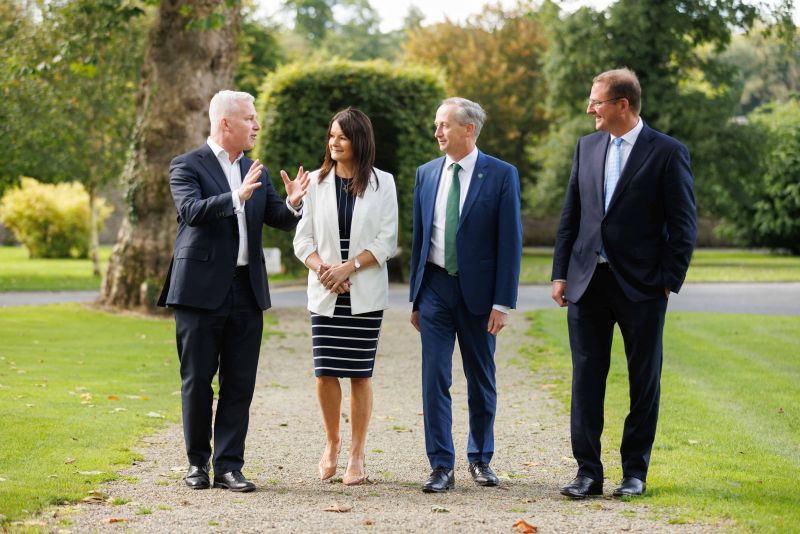
Companies without Sustainability Plans will be locked out of their markets…Shannon Chamber members hear
Leo Clancy, CEO, Enterprise Ireland (3rd left), keynote speaker at a Shannon Chamber lunch in Dromoland Castle Hotel pictured with (from left): Colin McDonald, chief executive, Fine Grain Property (event sponsor); Helen Downes, CEO and Eoin Gavin, president, Shannon Chamber. Photograph by Eamon Ward
Companies without sustainability plans will be locked out of their markets, either though procurement rules in a business-to-business context or through the concerns of consumers in a business -to-consumer context.
This was one of many key messages given to Shannon Chamber members by Enterprise Ireland CEO Leo Clancy when he addressed a luncheon in Dromoland Castle Hotel, sponsored by Fine Grain Property, during the Chamber’s inaugural sustainability week.
In a fast-paced, high-impact address Mr Clancy paid homage to the enormous contribution Irish-owned enterprise, supported by Enterprise Ireland, have made to the Irish economy in the twenty-five years since the organisation was founded.
“In that period, exports have grown from €8.5billion to €32billion. Enterprise Ireland clients now employ 218,000 people and, in 2022 alone, spent €38billion in the Irish economy in capital, buildings, equipment, payroll and services purchased, sustaining small economies all over the country,” he said.
Citing factors such as Ireland’s stable platform for business and its demographic as major contributors to this success, he said that the future will be marked, not solely by job creation but by the value and volume of those jobs.
“The world is getting more competitive and companies that are lean, digital, innovative and highly skilled will win and, given that Ireland is no longer a low-cost economy, a future focus on productivity is essential,” he said.
Focusing in on sustainability, he cited the results of a survey of 2,000 Enterprise Ireland clients, undertaken earlier this year, which showed that 66% of clients had no climate action response and 80% don’t measure their CO2 emissions.
Stressing the imperativeness for companies to start their green journeys, he congratulated Shannon Chamber on setting up a Sustainability Forum and hosting a week focused on sustainability in business. He said that the mandate given to Enterprise Ireland in the Government’s White Paper on Enterprise, published last year, is to focus in on carbon emission reduction in enterprise, equivalent to its focus on job creation.
Confident that Ireland will see further generations of Irish-owned firms growing and scaling up to join current leaders in their fields, such as Ei Electronics, now a market-leader in fire and gas detection, Mr Clancy predicted a future where the impact of Ireland companies to the national economy will be much greater than it is today. He said that, when combined with the success of the foreign direct investment sector, Ireland will have an economic base that will continue to be the envy of the world.
Following up on these remarks, Fine Grain Property’s chief executive Colin MacDonald, whose company has invested €300million in providing 1.25million sq. ft. of workspace nationwide, including at Westpark Shannon, to accommodate 60 companies and their 7,000 employees nationwide, said: “Shannon’s remarkable success has been driven by the sustained innovation which arises when talented people work with global and local entrepreneurial businesses, enabled by tertiary education and excellent infrastructure. Through our sustainable workplace communities at Westpark and across the country, Fine Grain Property looks forward to being part of the further development of Ireland’s renowned global innovation clusters.”
Shannon Chamber president Eoin Gavin in concluding the event said that scaling up the SME base and enabling them to remain indigenous through all growth phases remains a challenge for Ireland. Citing Ei Electronics as an exemplar company in this regard, he said its founder and chairman Mick Guinee’s ability to navigate change and innovation to enable the company to compete on a global stage when it comes to manufacturing, is a benchmark for other leaders to aspire to.
“Ei Electronics has scaled up but has determinedly remained an indigenous company. We need more Ei Electronics in Ireland,” he said.
